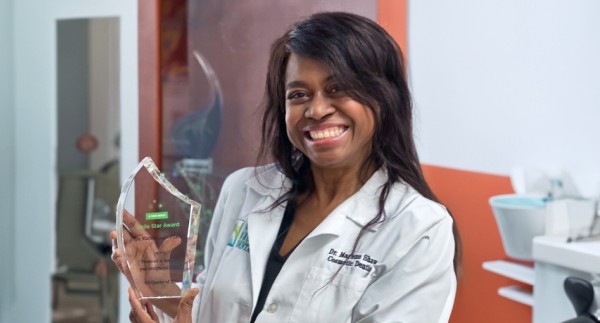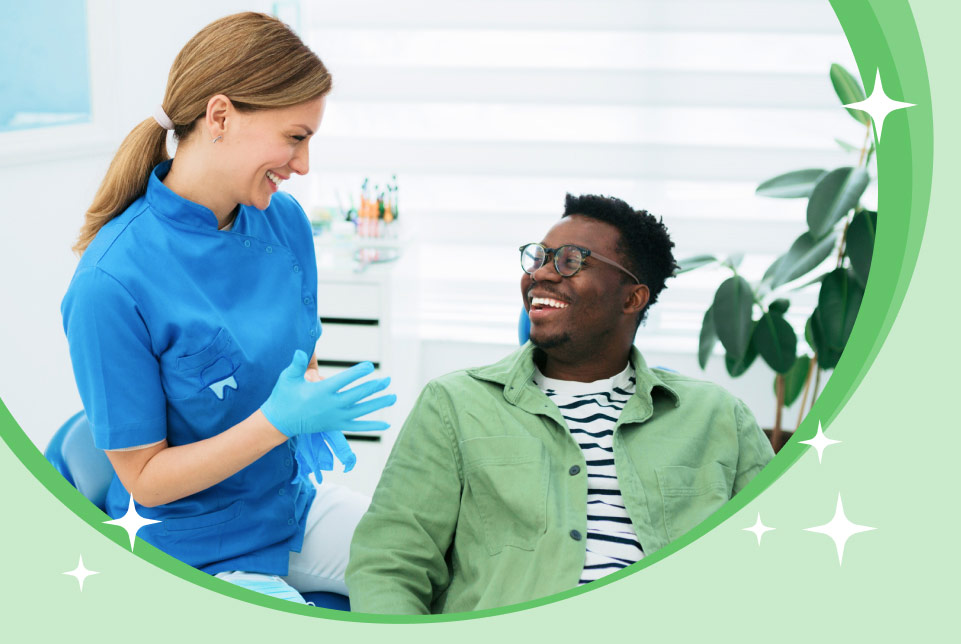
Smile Star spotlight: Dr. Marlene Shaw
As part of our ongoing effort to recognize the incredible work that those in the dental industry do for their patients and their communities, we’re pleased to announce the Smile Star award. Each quarter, we’ll highlight dentists, hygienists and office staff who have been nominated by their peers in recognition of their exceptional work.
It’s our sincere pleasure to introduce you to Dr. Marlene Shaw! Dr. Shaw is a practicing cosmetic and implant dentist at Water Brook Dental, serving patients in the Washington DC Metro Area. Born in Haiti, she traveled to the US for school and completed her bachelor’s degree in computer science at Queens College in New York City and her Doctorate of Dental Surgery at Howard University. We asked her to share some details about her life, her work and her thoughts on the dental industry.
Tell us a little bit about yourself. When you’re meeting someone for the first time, what do you want them to know about you?
That’s a very Washington kind of question! Well, on the professional side of things, I’ve been a dentist for two decades now. I’m a graduate of the Howard University College of Dentistry, class of 2003. I’ve spent 20 years in private practice, and I’ve picked a few areas of dentistry to focus on. I like to refer to myself as a cosmetic and implant dentist. Basically, a general dentist that focuses on doing the cosmetics side of things, like reconstructing and replacing missing teeth. It brings me joy and excitement to help rebuild people’s smiles, and I treat the whole family, adults and children. I’m originally from Haiti, which made me who I am today. I’m a third-generation dentist, as both my father and his father were dentists, although they never practiced in the United States.
Personally, I love sharing that I’m from Haiti. Being raised in Haiti means that I’m multilingual, which helps me feel connected to my roots and has really helped me in my practice day to day. When I’m not practicing dentistry, you’ll find me at the gym or ballet studio, or hanging out with family and friends.
What brought you from Haiti to the United States?
I grew up in Haiti as the child of two different worlds. My father was a highly educated man and a second-generation dentist. On his side of the family, there were lots of high-profile jobs. Lots of doctors, physicians and dentists and different health care specialists. There’s even an ambassador, an Olympic athlete, and a founding pastor of a large church in North America. My mother’s side of the family is the exact opposite. She was from a little town way out in the countryside, and she only had a first-grade education. But even though she didn’t have the kinds of advantages my father did, things like education were even more important to her. She pushed for my father to send us to the best schools, and when I finished high school, she encouraged me and then my younger sister to go to the United States for college. That’s how I wound up at Queens College in New York studying computer science.
Was it your intention to become a dentist right away, or did you make that decision later in your academic career?
Haha, I wish I could say that that I saw the future of dentistry and knew computer science would be relevant even back then, but no. I just liked physics and math and chose computer science for that reason. I knew I wanted to be some sort of a doctor, though. Either a physician, a JD or a PhD. I was looking seriously at medicine, and a friend of mine told me, “Well, why not dentistry? You have it in your background.” I liked that, and I really liked that it wouldn’t take as many years as a traditional medical degree!
You mentioned being multilingual. What languages are you fluent in?
I’m fluent in three languages: French and Haitian Creole, the two languages I grew up with, English and I have an excellent command of Spanish. Right now I’m also brushing up on my Russian. I studied it years ago for a while, and I’m just now getting back to it.
Studying other languages has definitely helped with my personal and professional development. Years ago when I was living in New York City, I already knew English, Spanish and French, and I decided to pick up a language that would be professionally useful. I considered Mandarin and Arabic, but decided to go with Russian as I was living near a huge population of Russian speakers. I also love to travel, and I’ve seen first-hand how welcoming people can be if you make an effort to speak their language, even if you can’t communicate fluently. Plus, learning languages helps to keep the brain sharp, just like puzzles, exercise and dance!
Let’s talk about your practice. What does a typical workday look like for you as cosmetic and implant dentist?
The biggest part of a typical workday is connecting with patients, especially new ones. If someone wants me to restore their smile, they need to feel that they can trust me to do right by them. For something like implants, trust is even more important, because the average person gets nervous when you tell them you want to screw metal into their mouth.
Of course, there’s also talking with team members, reviewing charts, planning out each day and week, all the things that need to be done for a dental practice to function. I also spend time on dental groups online. Some are linked to dental associations that I’m a part of, and others are just groups of dentists on social media.
Do you find social media especially useful as a dentist?
Definitely. If you ask my team members, they might tell you I’m a social media junkie. I’m a bit less active on TikTok and getting back on it, but I get a lot of use out of Instagram, Facebook and LinkedIn. LinkedIn is actually my favorite.
You’ve already mentioned some of the changes you’ve seen in the dental industry since you began practicing. What do you think the future holds for the industry?
What I’m seeing now is similar to what I saw early on. We made a transition from analogue to digital, from film x-rays to digital ones, from paper charts to everything being on computers. Now it’s the same thing with technologies like 3D printing and CAD/CAM equipment. Patients are also better informed than they used to be, especially the younger Gen Z patients. They ask questions and they want to understand how they’re being treated and why. They’ll look at their x-rays or other images, and they can see that there are issues, and the whole thing is more of a team effort than ever before. The technology has really added a lot to being able to explain things and help patients understand how their treatment will go.
The future of dentistry feels like it’s all happening now: artificial intelligence is already giving us so many tools to read digital x-rays, but it’s taken us beyond that. We’re able to run patient smile simulations in seconds, not hours or days. 3D intraoral scanning has been around for a while, but it’s been such an amazing platform for so many integrations. I feel as if dentistry as an industry is catching up with some other areas where technology has integrated for a while.
One last question! Speaking of Gen Z, what’s some advice that you would give to someone fresh out of dental school today?
I would say that if you’re going to do dentistry, do it because of passion. Dentistry has changed a lot, faster than I would have thought, and it’s not enough to go into it just because it’s a “secure” profession anymore. Yes, you can do well financially, but you have to ask yourself what you’re doing for patients, too. You’ve got to bring your mentors along and be a mentor. Give part of yourself to other people and let other people give parts of themselves to you. I’ll say this without feeling any embarrassment whatsoever: Howard University was the only dental school that accepted me. They gave me a chance, and in return, I stay connected and I mentor students and I give back where I can. That’s what I would tell a new graduate: it’s hard work. It’s not easy. There are real rewards, but you’ve got to give it everything you have.
Thank you, Dr. Shaw, for all that you do for your patients and your community. Congratulations on being chosen as our last Smile Star of 2023!
Visit Dr. Shaw’s personal website for more information, or her practice if you’re in the greater DC Metro Area. You can follow Dr. Shaw on Facebook, Instagram, LinkedIn and YouTube.
Do you know someone who should be a Smile Star? Email us at smileaward@delta.org with their contact information and the reason your nominee should win this award.
Recent posts
- Oral health care for seniors: Improving access, improving outcomes
- Simplify your credentialing with CAQH: Check out our webinar recordings
- Updated 2026 CDT codes are here
- View our CDT 2026 Updates webinar and stay on top of code changes
- EFT will become our standard payment method starting 1/1/27
- Start the year strong: Key reminders to support your practice in 2026
- Discover 3 tips to power up your practice with new workflows
- Updated 2026 CDT codes are here
- Partner with us to improve the health outcomes of our shared members
- Say hello to our 2026 Medicare Advantage DHMO partners
